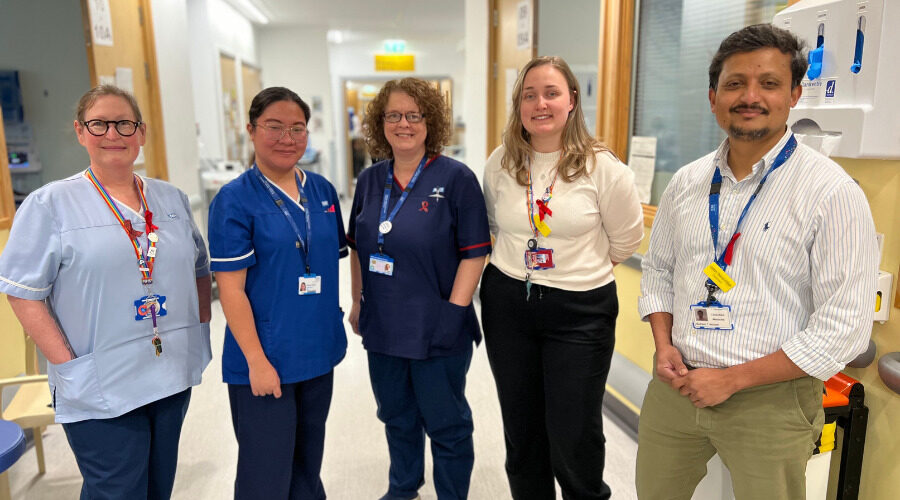
Spotlight
How we’re helping to make HIV testing part of everyday life, for everyone
This week is National HIV Testing Week, and our Starling Clinic and Somerset-Wide Integrated Sexual Health (SWISH) colleagues want to reinforce the message that HIV testing is for everyone.
The national campaign strapline, ‘I Test’, serves as a crucial reminder that knowing your HIV status is a key step in maintaining good health and preventing the spread of the virus.
HIV can affect anyone, but huge advances in treatment mean that those living with HIV can lead stable and healthy lives, without worrying about passing the virus to others.
Treatment is now so good that very few people with HIV in the UK develop AIDS, but early diagnosis is key, and in Somerset, nearly one in two new HIV diagnoses are late, leading to poorer health and increased transmission.
In 2022, half of those aged 15 and older accessing HIV care in the UK were over 50 years old, compared with 27% in 2013. This rise is because effective treatment has led to fewer HIV-related deaths, and improved survival, as well as on-going diagnoses.
In the same year, 50% of adults accessing HIV care were in the white ethnic group, 30% were black African, 11% were among the Asian or mixed or other ethnic group, and 5% were in the black Caribbean or black other ethnic group.
And overall, 98% of the people living with a diagnosed inflection in England in 2022 received antiretroviral treatment (ART), compared with 90% in 2011.
During the week, our colleagues on the acute medical unit at Musgrove Park Hospital will be offering a free HIV test to every patient admitted to the unit, either from our emergency department or direct from their GP.
Each patient will be handed a leaflet that explains our HIV testing initiative, and if they have any questions or concerns, they can speak to the team. Of course, patients can choose to decline a test as it’s opt-out, but we’ll be strongly encouraging them.
Dr Sathish Thomas-William, our consultant physician for genitourinary/HIV medicine, explains:
“There’s often a misconception that only people in certain groups can get HIV, but this is really not the case and everyone should consider getting a test, particularly if they’ve had unprotected sex or multiple partners.
“It’s fair to say that as we’re such a rural county, HIV testing isn’t at the foremost of most people’s minds, but because of this, about half of all diagnoses are late, which can lead to poorer outcomes and a lower life expectancy for the patient.
“If HIV is diagnosed at the earliest possible stage, then it’s more likely to be treated as a stable long term condition, and the treatment can mean they’ll be able to lead a normal life. Having an undetectable viral load means they can’t transmit the infection through sexual contact – a theme of the national Undetectable = Untransmittable (U=U) campaign.
“We’re also being joined by our colleagues at The Eddystone Trust on a stand in the Concourse at MPH on Friday 8 February, from 10am – 2pm, where people can grab a HIV test kit and take it away.”
Dr Kanch Seneviratne, our GUM/HIV consultant physician at SWISH and Starling, says:
“Sadly, HIV does not have the awareness it should because of the stigma around talking about sex, or testing for sexually transmitted infections like HIV.
“We want to use HIV Testing Week to challenge this stigma and make testing for HIV and living with HIV a normal thing.
“Advancements in treatments have transformed this disease, meaning most people with HIV have a normal life expectancy, and effective treatment means they can’t pass on HIV to anyone through sex.
“People can now either take one tablet every day, or have an injection every couple of months, so they don’t even necessarily need to take tablets every day.
“Testing for HIV is so important because if someone doesn’t test, they won’t be able to benefit from knowing their status, whether positive or negative.
“If a person tests negative, they’ll have access to prevention advice and medications so they can continue to stay negative. If they test positive, they’ll have access to effective, well-tolerated treatments, so they can live a normal life and can be confident that they can’t pass HIV to anyone.
“Everybody and anybody having sex at any age can get HIV. Testing is easy, quick, free, and confidential, and it’s even possible to test at home with a single finger prick, so my message to people would be to do it for you, your partner, your family, or your community.”
How to get a HIV test
Testing for HIV is free, confidential, quick and easy, and puts you in control.
There are a number of ways to test, including:
- Self-testing at home - order a test at freetesting.hiv, you just need a finger-prick blood sample and then you can read your own result immediately at home, or send off a blood sample and get results usually within 72 hours of posting
- SWISH - can offer a blood test where you get your results within 20 minutes. Go to swishservices.co.uk or call 0300 1245 010
- The Eddystone Trust - eddystone.org.uk/pages/testing
- Your local GP
- Starling Clinic , Musgrove Park Hospital
Free testing is available at:
- Free Testing HIV - freetesting.hiv
- SWISH Services – to find a drop in HIV testing near you, visit - https://bit.ly/HIVtestWeek24 or call 0300 1245 010.
